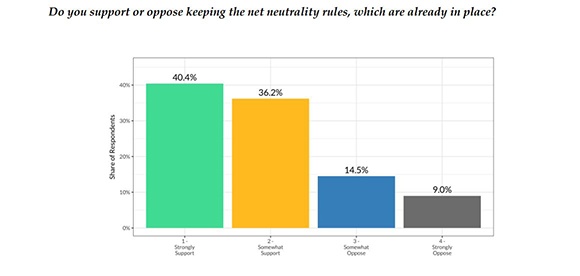
A recent study conducted by Freedman Consulting found that Americans across the political spectrum support net neutrality. The study also found a bipartisan belief that access to the internet is essential and that the government should play a role in expanding internet access.
About three-quarters (77%) of the survey respondents indicated that they believe the Federal Communication Commission’s existing Open Internet rules should be kept in place. Unlike many political issues, this issue received support from all major political parties – three-quarters of both Republicans (73%) and Independents (76%), and 4 in 5 Democrats (80%) noted their support for net neutrality rules.
An underlying reason for this broad support of net neutrality rules is likely because of the understanding that internet access has become necessary for both economic success and free expression. When given the statement, “internet access is essential and everyone needs it in the 21st century economy,” three-quarters (75%) of the survey respondents agreed. The study also found that more than 4 in 5 (83%) respondents viewed internet access as on-par with other essential infrastructure, like roads and bridges, and more than two-thirds (70%) agree that the government should provide funding to help rural and low-income Americans access the internet.
While net neutrality can seem like an issue best left to legislators and tech giants, libraries have a lot to lose if ISPs no longer have to abide by net neutrality regulations. On a practical level, libraries will likely have to choose between paying more for usable internet access or trying to function using cheaper, slower connection speeds. From an ethical standpoint, libraries are encouraged to advocate for intellectual freedom, which is a right that would be undermined if internet access is blocked or throttled. However, this report suggests that library patrons support regulations that will allow libraries to continue providing access to information.
For information about how Americans view net neutrality, the full report can be found here.
Note: This post is part of our series, “The LRS Number.” In this series, we highlight statistics that help tell the story of the 21st-century library.